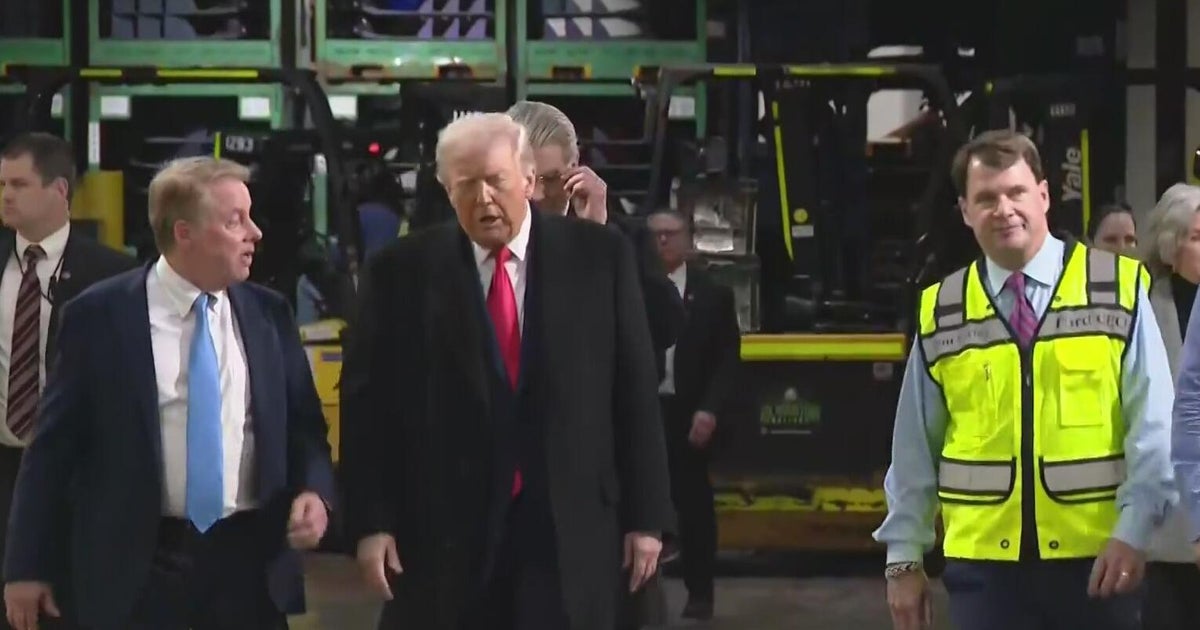Trump's next trade target: China's IP theft
Potential for a trade war with China is rising as President Donald Trump moves ahead with steel and aluminum tariffs, some analysts and economists warn. With the tariffs set to go into effect 15 days from now, Mr. Trump is also hinting at accelerating the U.S. investigation into intellectual property theft by China, America's biggest trading partner.
"The U.S. is acting swiftly on Intellectual Property theft. We cannot allow this to happen as it has for many years!" Mr. Trump tweeted on Wednesday.
In a meeting with his Cabinet before the metals tariff signing Thursday, the president said he reserves the right to change the figures and add and drop countries at will. Mr. Trump also suggested he wants to push "reciprocal" taxes with other nations.
"We're going to be doing a reciprocal tax program at some point," Referring to China, Mr. Trump said, "It's a mirror tax. They charge us 50, we charge them 50."
On Thursday, before the signing in Washington, Chinese Foreign Minister Wang Yi cautioned that his country is ready to respond if Mr. Trump increases pressure directly on a trading partner whose exports to the U.S. totaled more than $500 billion compared to U.S. exports to China of about $130 billion last year.
"A trade war is never the right solution," Wang told reporters at a briefing on the sidelines of China's national legislative session, according to Bloomberg News. "In a globalized world, it is particularly unhelpful, as it will harm both the initiator and the target countries. In the event of a trade war, China will make a justified and necessary response."
It's hard to pinpoint just how much intellectual property -- patents, trademarks and copyrights -- may be on the line. The U.S. loses about $600 billion a year in IP theft, mostly to China, according to an opinion piece last year from Dennis C. Blair, a former director of national intelligence and a former commander in chief of the U.S. Pacific Command; and Keith Alexander, former commander of the United States Cyber Command and a former director of the National Security Agency.
"The ongoing U.S. investigation into whether China is forcing U.S. firms to hand over intellectual property may lead to further tariffs and investment restrictions," analysts from the firm Capital Economics wrote in a note this week.
Strategic tariffs on "select imports" from China might have a "materially larger impact" than the steel and aluminum measures under today's proclamation, analysts from UBS wrote.
For imports, risk is greatest for communication equipment (i.e. cell phones), computer equipment, apparel, semiconductors and some consumer goods. For exports, aerospace parts, agricultural products and motor vehicles are most vulnerable "to potential retaliatory actions," the UBS analysts said.
"We acknowledge that the implementation of any tariff would be challenging," the UBS analysts wrote.
Apple (AAPL) may have the most to lose among tech giants in a trade war with China, Bloomberg Gadfly columnist Tim Culpan wrote. Apple gets almost $45 billion in annual revenue from China. Intel (INTC), at more than $14 billion, is the next-biggest, Cuplan wrote citing Bloomberg data.
Lawmakers and companies have long called for firmer action against Chinese IP theft. U.S. Senate Minority Leader Chuck Schumer on Thursday said Mr. Trump is right to go after China and IP theft. But he also said the steel and aluminum tariffs may make it difficult for other countries to join the U.S. in its pursuit.
"While the president's instincts are correct, the execution on these tariffs is poor. That's the difference here," Schumer said.
Some U.S. CEOs are also weighing in, such as Elon Musk, the billionaire chief of Tesla (TSLA).
"For example, an American car going to China pays 25 percent import duty, but a Chinese car coming to the US only pays 2.5 percent, a tenfold difference" Musk tweeted in response to one of Mr. Trump's own tweets on the subject. "We raised this with the prior administration and nothing happened. Just want a fair outcome, ideally where tariffs/rules are equally moderate. Nothing more. Hope this does not seem unreasonable."
In the years since China was allowed into the World Trade Organization in 2001, its global expansion has diminished its dependence on the U.S. as a consumer market, argued Ryan Hass, a fellow at Brookings Institution's John L. Thornton China Center and the Center for East Asia Policy Studies, in a recent post.
"In relative terms, the importance of the American market for China has declined, a trend that will continue as China's economic growth model becomes less export-dependent and more consumption-based," he wrote.
Chinese exports to the U.S. account 3 percent of its GDP when using a "value added" measure. Chinese President Xi Jinping "will prioritize domestic economic initiatives he believes are necessary to transition China's economy," Hass said, "even if it comes at the expense of friction with Trump."



